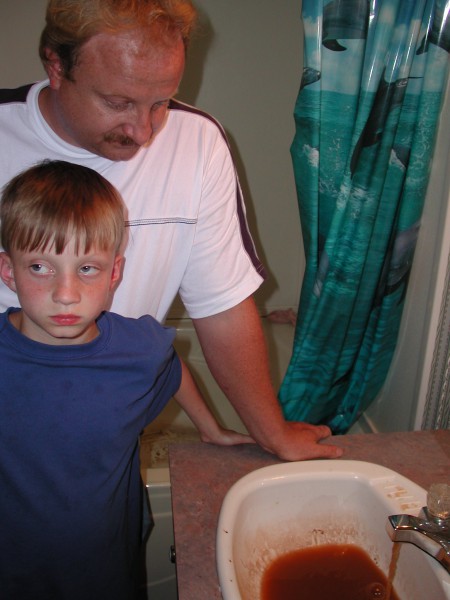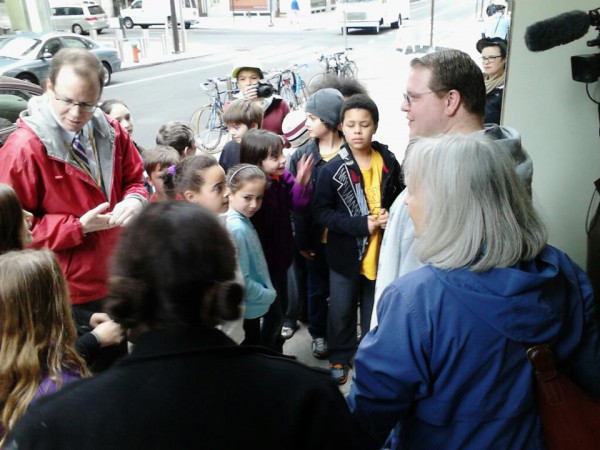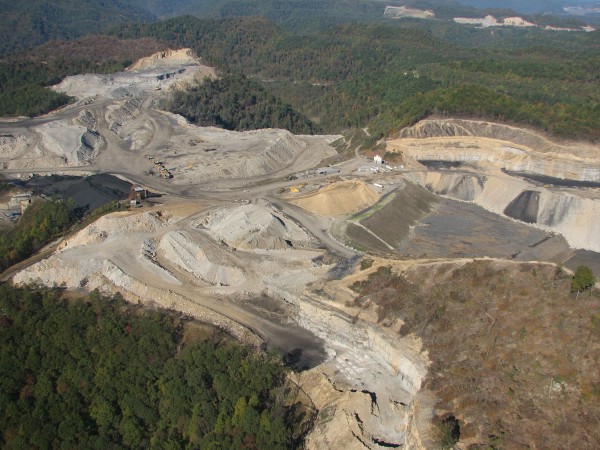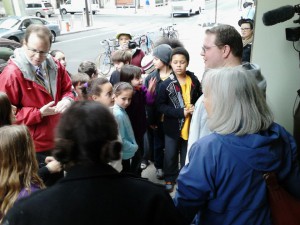I stood behind the table watching the young girl study the images. Her long dirty-blonde hair glistened in the sun and swayed in the chilly breeze. She must have been around eleven or twelve. She spoke softly to her younger brother. He was about seven or eight but you could see his young mind trying to process what she was saying. “It’s dirty water,” she said “and people have to drink it.”

This Mingo County family’s well water was clean before the coal slurry injections began. Photo by Vivian Stockman, www.ohvec.org.
They were just a couple of the many passer-byers on the street in front of the courthouse in Fayetteville during the Earth Day celebration there on April 2Oth. I had set up a table with information on OVEC and our joint project in Fayette County led by Southern Appalachian Labor School, the Coalfield Environmental Health Project.
The two children were examining photos of contaminated water from the communities of Rawl and Prenter and other areas. Pictures of acid mine drainage, sinks with water red as tomato soup, toilet tanks that had turned black, and images of people holding up samples of their water. Some black, contaminated with coal slurry, some red or brown, and some with particulates of who knows what swirling around. They quickly looked over the images of the barren moonscapes that were once mountains with lush green forests. I listened as closely as I could without looking conspicuous. Only hearing bits and pieces but the expressions on their faces spoke volumes. They were shocked, disgusted and I think she expressed a little bit of anger and sadness.
It made me think back to earlier that week. I was in Philadelphia at a rally in front of the offices of EPA Region 3. I had joined local citizens from southwestern Virginia who were fighting mountaintop removal in their backyards too and folks from the Philadelphia area who were there to support us. Some were students from Swarthmore College who are working on a fossil fuels divestment campaign on campus and some were allies from the Earth Quaker Action Team. We had spent about 2 hours on that chilly, grey day chanting and singing and holding signs that said things like “Appalachia is locked to dirty water” and “The EPA has the key.” As we wrapped up our rally, I turned to see a gentleman walking up with about 15 children.
He introduced himself and his class. They were a group of 4th graders at a nearby Quaker school. He said they had been studying civil disobedience and nonviolent direct action. I knew why. Quakers have a history of standing up for what’s right. He asked us if we would explain to the kids why we were protesting. I told them, “we are here in front of the Environmental Protection Agency protesting because of mountaintop removal.” Instantly I could see the look of confusion on their faces at the words, “mountaintop removal”. The children in Philadelphia had never imagined such a thing.

Dustin White and Jane Branham explaining mountaintop removal to a group of 4th graders outside the EPA Dist 3 office in Philadelphia.
Photo by Louis Martin
We were immediately bombarded with questions. Jane Branham from Southern Appalachian Mountain Stewards (SAMS) and I tried to answer every one while trying to make it simple for them to understand. They were children after all; the answers couldn’t be too complicated. We explained how it contaminates water and is making people sick and explained away the jobs myth. I watched their reactions. They were confused by how anyone could blow up a mountain especially when it makes people sick. If only I could have told them how I, at 29, was just as confused about it. You could see it in their faces – the confusion, fear, sadness, and anger. If they didn’t have to return to class I think they were ready to join us for another round of chants.
Children. To them the world is a different place. They understand how special life can be, whether it’s a flower or a cute little animal or another person. They would certainly never think of harming another person for any reason and they especially wouldn’t think about blowing up a mountain for coal or making someone’s water turn into poison. They are loving and compassionate. The children at the table in Fayetteville and in Philadelphia hadn’t thought about mountaintop removal as part of their world. They hadn’t really had to deal with it where they lived. To them it was new, an alien idea. But you could see it on their faces, they didn’t like it. In a way they were lucky.
But there are children in Appalachia who aren’t so lucky. The children who have to live with mountaintop removal right over their homes and schools and have to drink and bathe in that “dirty water”; the words the young girl used to describe it. They are the ones truly in the wake of mountaintop removal. All the children with cancers and other illnesses to those born with a 46% higher chance of birth defects because their mom’s lived near MTR all because they have to blow up a mountain for coal. It doesn’t take an adult mind to realize that’s just not right. All the little children our elected officials have failed to protect.
Children. That’s ultimately who we fight for, right? Not just the children in Appalachia, but all the children – from those 15 school children there on the sidewalk in front of the EPA office in Philly to the children that ran around the street in front of the Fayette County Courthouse and across the world. It is their future we gamble with. As U.S. citizens we are supposed to “promote the general welfare, and secure the blessings of liberty to ourselves and our posterity.” That’s what the preamble to the Constitution says. The word posterity means future generations. That’s our children and their children and so on. They should never have to be afraid of drinking bad water. They should never have to breathe toxic air. And it will be them who are stuck cleaning up what we do today.
No, the world owes them the same gentleness and compassion they give to the world. We should never have to justify their suffering to a job or paycheck. They deserve better and we deserve to give them better. They look to adults for examples and just what exactly are we teaching them when we say something like it is ok to blow up a mountain and potentially make someone sick, maybe even another child, just so someone can have a job. How do you justify any of it to a child? The answer is you can’t. If you ever face that situation just stop and think, what would a child’s reaction be? What would the look on their faces be if you said something like that to a child? I bet it would be something like fear, anger, or sadness.
Those children in Fayetteville and the Quaker students in Philadelphia reminded me why I fight mountaintop removal and those who try to justify it and allow it to happen. And the kids did it all without saying a word, just the looks on their tiny faces and the thoughts behind their wide eyes. I do this work for them and the children of Appalachia and the children around the world. They reminded me just how precious life can be, all forms of life, because to them it’s just as precious. There is a certain wisdom and intelligence in a childs mind. Something some seem to lose as they get older.
As adults, maybe we should be looking to our children to teach us how to care for the world and each other, not the other way around. This is their world and what type of legacy should we be leaving them? As the old Native American proverb goes; “Honor the earth and remember that it wasn’t handed down from your ancestors but loaned to you by your offspring.”










